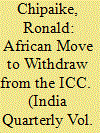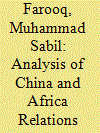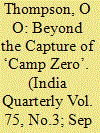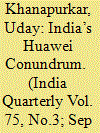|
|
|
Sort Order |
|
|
|
Items / Page
|
|
|
|
|
|
|
| Srl | Item |
| 1 |
ID:
169363


|
|
|
|
|
| Summary/Abstract |
The main purpose of this article is to examine the absence of political security and its consequences on state security of Ethiopia. The study was conducted through case study design and used qualitative research approach, and key informant interview was held. The main finding of the article is that in Ethiopia there is a prevalence of political insecurity which is committed by government officials via security sectors and which has led to the existence of mistrust on security sectors, the expansion of mob justice and the existences of social insecurity in the state.
|
|
|
|
|
|
|
|
|
|
|
|
|
|
|
|
| 2 |
ID:
169364


|
|
|
|
|
| Summary/Abstract |
Africa’s relationship with the International Criminal Court (ICC) has been strained over the past few years. Threats by a number of African states to withdraw from the ICC’s jurisdiction have marked a crescendo in the strained relationship. This study looks at the issues surrounding the proposed or threatened mass withdrawal by African countries and the implications for peace and justice in the African continent. Utilising interviews with a cross section of key informants including members of the African diplomatic community resident in Zimbabwe, this study highlights that it is difficult for African states to withdraw en masse since not all states are agreeable to this stance. The study further highlights that although the ICC is not a perfect institution, it is the only alternative court of last resort that can deal with human rights and international humanitarian law violations as well as impunity in the continent. The proposed African Court of Justice and Human Rights (ACJHR) has not yet taken root owing to a shortage of adequate ratifications of the protocol establishing it. Thus, although concerns of unfair targeting of African leaders and individuals by the ICC could be considered valid, African states need to find a way of establishing a cordial relationship with the ICC to ensure the protection of individual rights while they establish regional institutions to deal with cases currently being referred to the ICC.
|
|
|
|
|
|
|
|
|
|
|
|
|
|
|
|
| 3 |
ID:
169366


|
|
|
|
|
| Summary/Abstract |
China’s ‘One Belt One Road’ (OBOR) initiative has been billed as its most ambitious project ever in trying to shape and influence behaviour in the international system in line with her growing stature. At the same time, growing Sino-Africa relations have been the subject of scholarly debate with supporters taking an optimistic view, also presented by China itself, of this relationship being a win-win partnership. Critics led by the United States argue China is just using Africa to extract resources for its use, an allegation it refutes. The authors therefore sought to look at Sino-African relations but focussing on the implementation of OBOR in the African continent. Being the centrepiece of China’s foreign policy since 2013, a study on OBOR in Africa will give an understanding and hopefully answer some questions surrounding these relations. The lack of official bilateral agreements between China and some African countries has been examined, together with the possibility of expansion of the OBOR initiative to cover more African states.
|
|
|
|
|
|
|
|
|
|
|
|
|
|
|
|
| 4 |
ID:
169362


|
|
|
|
|
| Summary/Abstract |
In 2016, the spiritual base of Boko Haram, known as ‘Camp Zero’ was captured. With such success, most had thought that the chicken has finally come home to roost. Unfortunately, it was not to be. Because aside from Boko Haram, the country seems to experience other vagaries of insecurity. This range from kidnapping, cult and ritual groups in the south—such as female pant hunters, Badoo—oil bunkering and pipeline vandalism, cattle rustling and herdsmen–farmers crises, among others. Against this backdrop, this study is an attempt to trace the history of the terror group and examine the numerous insecurity challenges across the country despite international collaborations. The study revealed among other things that the perpetuation of terror and insecurity in the land is a reflection of the nature of the state itself—a failing, weak state. The study recommends that until there is a solution to the nature of the state itself, the insecurity will continue. Some of the solutions suggested are entrenchment of good leadership, political will, rule of law, good governance, eradication of poverty and illiteracy, and inclusive policies, among others.
|
|
|
|
|
|
|
|
|
|
|
|
|
|
|
|
| 5 |
ID:
169367


|
|
|
|
|
| Summary/Abstract |
Huawei, the Chinese telecom giant, has emerged as a key player in the provision of infrastructure required to support 5G wireless networks, the adoption of which will be foundational to recipient countries’ deployment of emerging technologies such as artificial intelligence and the Internet of things. At the same time, however, security concerns with respect to Huawei’s ties to the Chinese army and state abound, prompting a number of countries to ban the company from supplying them said telecom infrastructure. India, however, is on the fence in this regard. This article assesses India’s Huawei conundrum through a conceptual framework of economic dependence wherein the costs of a ban and willingness to ban are examined in detail. It is argued that since the expected costs of banning Huawei equipment and the security risks of using them are both substantially high, India’s course of action must be to defer a quick decision and bargain for benefits and assurances.
|
|
|
|
|
|
|
|
|
|
|
|
|
|
|
|
| 6 |
ID:
169365


|
|
|
|
|
| Summary/Abstract |
The quest for dominance/leadership in the region of Africa has been an enduring component of Nigeria’s foreign policy. However, the literature on Nigeria’s Africa policy is replete with ideas that favour the policy and those that make the policy indefensible. These opposing ideas—including the underlying arguments—have been carefully articulated by foreign policy authors, observers and practitioners. Although the arguments for the retention of the policy have been largely influenced by realist considerations, those holding opposing views have wondered whether sustaining the policy will be in the overall interest of Nigeria—particularly given the country’s changing/fluctuating fortunes in pursuing the policy. While this study finds the contending views intellectually stimulating, its objective is to contribute to the debate by offering a perspective which represents a compromise position between the contending ideas. This study argues that it will be in Nigeria’s overall interest to retain the policy while allowing critical reforms that could help mitigate the misgivings surrounding the policy.
|
|
|
|
|
|
|
|
|
|
|
|
|
|
|
|
| 7 |
ID:
169361


|
|
|
|
|
| Summary/Abstract |
The influence of a constitution may seem obvious particularly in Africa. Sometimes, there are tensions between the principles supporting governance issues such as an electoral process and the promotion of majority rule; giving a voice for minorities, inclusiveness, and freedom of expression; assembly; the free press and political culture. This study employs a content analysis to examine the concept of politics and constitutionalism in Africa and how the rule of law can be entrenched. The findings provide lessons in the development of constitutionalism relating to governance of the political life in which the constitutional forms are located. In some cases, regional institutions have only paid lip service. Elites amend the constitution to reserve for themselves unfettered discretion on public affairs. It appears that electoral systems in some African countries have fallen short of expectations of a democratic process due to non-compliance of the rule of law, lack of the practice of constitutionalism, weak institutions and bad political culture. Kenya and Zimbabwe serve as examples where election results have been disputed heavily. It is recommended that politics should be instrumental to the implementation of constitutions and not vice versa and that Afro-pessimism or Afro-optimism should translate to Afro-realism.
|
|
|
|
|
|
|
|
|
|
|
|
|
|
|
|
| 8 |
ID:
169368


|
|
|
|
|
| Summary/Abstract |
This study elaborates on the European Union’s (EU) Balkan policies evaluating the developments in the Western Balkans from the post-Cold War era until today. In addition, the study will tackle the EU policies and practices in the Western Balkans on the basis of the principles of the domino theory. In this context, the EU believes that destabilisation due to conflicts in former Yugoslavia after disintegration has also destabilised other countries in the region in domino effect. This situation means both the region and the EU will encounter security threat. In this regard, the study dwells upon EU policies in the region to provide financial aid in an attempt to ensure development and sustainability which will foster stability on the basis of the assumption that these countries in the region will be accepted to the EU as member countries after ensuring stability.
|
|
|
|
|
|
|
|
|
|
|
|
|
|
|
|
|
|
|
|
|